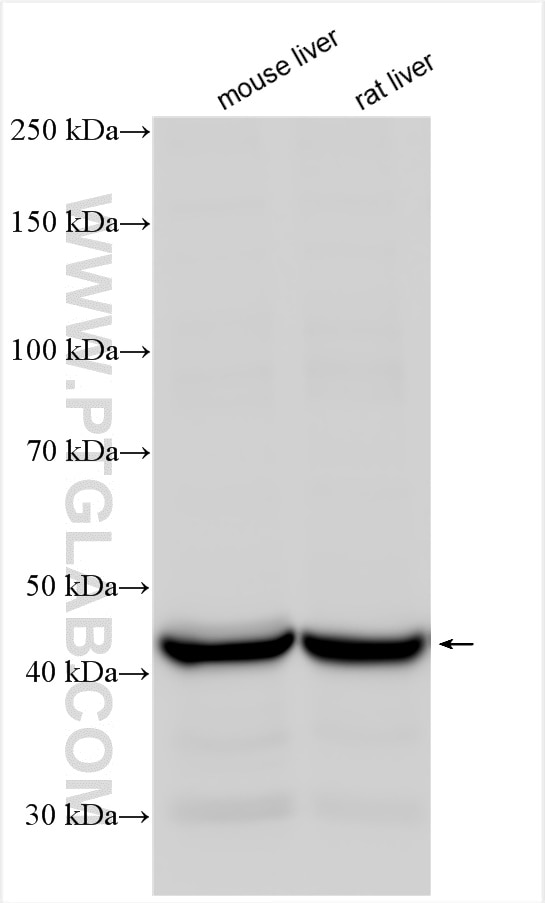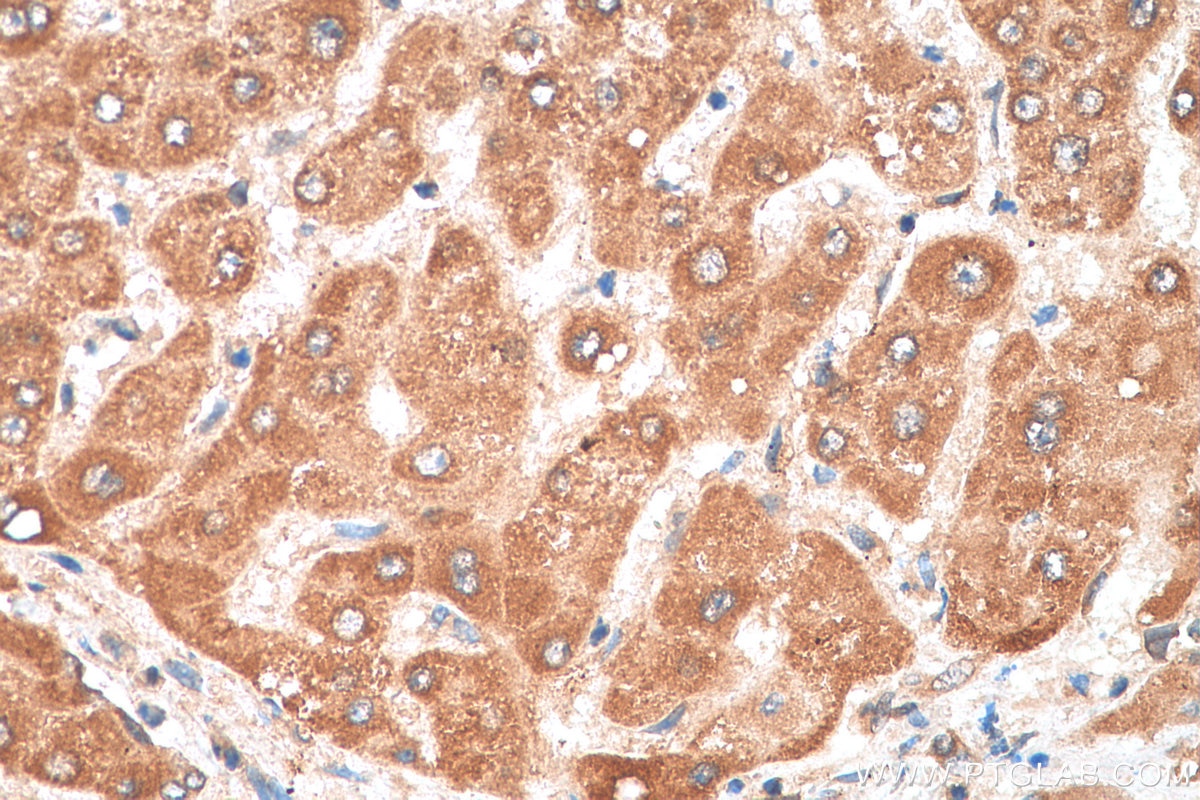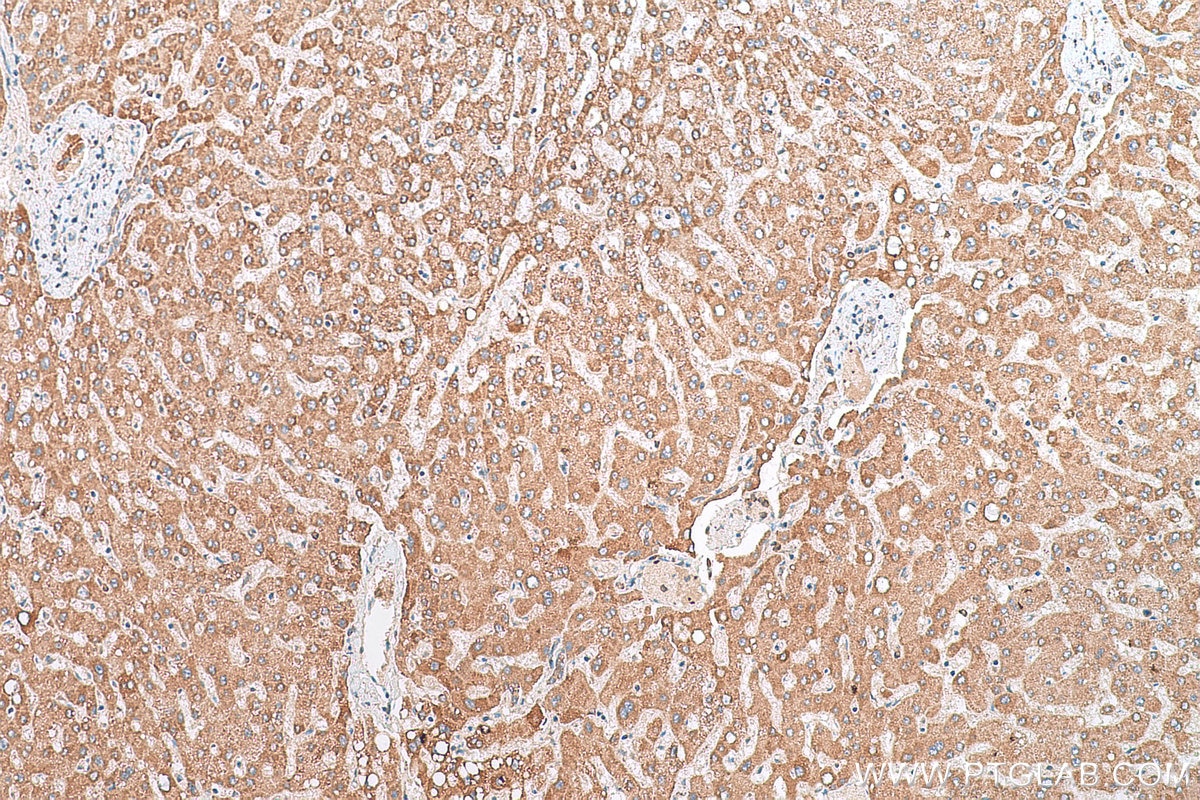- Featured Product
- KD/KO Validated
BCKDHA Polyklonaler Antikörper
BCKDHA Polyklonal Antikörper für WB, IHC, ELISA
Wirt / Isotyp
Kaninchen / IgG
Getestete Reaktivität
human, Maus, Ratte
Anwendung
WB, IHC, ELISA
Konjugation
Unkonjugiert
Kat-Nr. : 30028-1-AP
Synonyme
Geprüfte Anwendungen
| Erfolgreiche Detektion in WB | Mauslebergewebe, HepG2-Zellen, Rattenlebergewebe |
| Erfolgreiche Detektion in IHC | humanes Lebergewebe Hinweis: Antigendemaskierung mit TE-Puffer pH 9,0 empfohlen. (*) Wahlweise kann die Antigendemaskierung auch mit Citratpuffer pH 6,0 erfolgen. |
Empfohlene Verdünnung
| Anwendung | Verdünnung |
|---|---|
| Western Blot (WB) | WB : 1:2000-1:16000 |
| Immunhistochemie (IHC) | IHC : 1:200-1:800 |
| It is recommended that this reagent should be titrated in each testing system to obtain optimal results. | |
| Sample-dependent, check data in validation data gallery | |
Veröffentlichte Anwendungen
| KD/KO | See 1 publications below |
| WB | See 4 publications below |
Produktinformation
30028-1-AP bindet in WB, IHC, ELISA BCKDHA und zeigt Reaktivität mit human, Maus, Ratten
| Getestete Reaktivität | human, Maus, Ratte |
| In Publikationen genannte Reaktivität | human, Maus, Ratte |
| Wirt / Isotyp | Kaninchen / IgG |
| Klonalität | Polyklonal |
| Typ | Antikörper |
| Immunogen | BCKDHA fusion protein Ag32613 |
| Vollständiger Name | branched chain keto acid dehydrogenase E1, alpha polypeptide |
| Berechnetes Molekulargewicht | 50 kDa |
| Beobachtetes Molekulargewicht | 42-50 kDa |
| GenBank-Zugangsnummer | BC008933 |
| Gene symbol | BCKDHA |
| Gene ID (NCBI) | 593 |
| Konjugation | Unkonjugiert |
| Form | Liquid |
| Reinigungsmethode | Antigen-Affinitätsreinigung |
| Lagerungspuffer | PBS with 0.02% sodium azide and 50% glycerol |
| Lagerungsbedingungen | Bei -20°C lagern. Nach dem Versand ein Jahr lang stabil Aliquotieren ist bei -20oC Lagerung nicht notwendig. 20ul Größen enthalten 0,1% BSA. |
Hintergrundinformationen
branched chain keto acid dehydrogenase E1, alpha polypeptide (BCKDHA), the gene encoding the regulated subunit of BCKDC was only one of two primary susceptibility genes identified that affected the risk of both type 2 diabetes mellitus (T2DM) and obesity (PMID: 25287287). BIX01294 transcriptionally downregulated the transcription of BCKDHA, which is essential for fueling the tricarboxylic acid (TCA) cycle. Studies have shown that KDM3A, a Jumonji histone demethylase, epigenetically regulates BCKDHA expression by binding to the BCKDHA gene promoter (PMID: 34876693). Moreover, at least four genes including BCKDHA, branched chain keto acid dehydrogenase E1, beta polypeptide (BCKDHB), dihydrolipoamide dehydrogenase (DLD), and dihydrolipoamide branched chain transacylase E2 (DBT) have been reported to be the causative gene for Maple syrup urine disease (MSUD) (PMID: 34187135).
Protokolle
| PRODUKTSPEZIFISCHE PROTOKOLLE | |
|---|---|
| WB protocol for BCKDHA antibody 30028-1-AP | Protokoll herunterladen |
| IHC protocol for BCKDHA antibody 30028-1-AP | Protokoll herunterladenl |
| STANDARD-PROTOKOLLE | |
|---|---|
| Klicken Sie hier, um unsere Standardprotokolle anzuzeigen |
Publikationen
| Species | Application | Title |
|---|---|---|
Clin Nutr The effects of vitamin B6 on the nutritional support of BCAAs-enriched amino acids formula in rats with partial gastrectomy | ||
J Thromb Haemost Branched-chain amino acids promote thrombocytopoiesis by activating mTOR signaling
| ||
Adv Sci (Weinh) Inhibition of CDH11 Activates cGAS-STING by Stimulating Branched Chain Amino Acid Catabolism and Mitigates Lung Metastasis of Adenoid Cystic Carcinoma | ||
Theranostics Branched-chain amino acids deficiency promotes diabetic cardiomyopathy by activating autophagy of cardiac fibroblasts |





